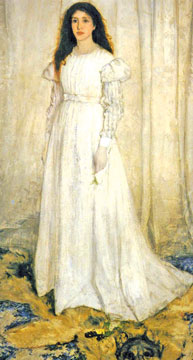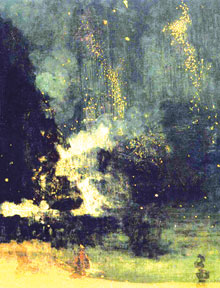|
The art of Whistler:
Symphony in white
by Gwen Herat
|

The White Girl by Whistler in 1862 at the National Gallery
of Art, Washington. |
Each painter appears differently to the viewer who has the right to
sit in judgement as to what he feels. Ask 10 people for their opinion
and they all will vary.
Take a look at Whistler's art; it is all freedom and verve, something
that many lack because most of them are so tensed up until the paintings
are done which subconsciously reveal in some paintings, for example the
colour mix-up. As with so many of Whistler's paintings, beauty is not
only in formal inventions and painterly innovations but in the freedom
of expression both in brush and mind.
The gorgeous brushstrokes freely used by the artist in Nocturne in
black and gold is like fireworks set against a darkened night. He has
highlighted only the glow as found in embers, truly a masterpiece in oil
and wood, 23 ˝ x 18 1/3 in/ 60.3 x 46.4 cm held in the Deteroit
Institute of Arts.
Like falling showers of fire-flakes, art-lovers will realise the
magnitude of this art-piece of Whistler. This is just one of his great
paintings.
He became obsessed with the idea of painting that would combine the
grace and simplicity of Greek terracota statues such as Tarangra figures
with stylish designs from orient prints along with artefacts.
They served well his mental capacity. The lightness and delicacy of
this technique could not have been more distant to influence the colour
artist used in early paintings but not Whistler who had his own
colourisation. He was able to overcome the shortcomings that posed a
hazard to other painters of his time. Such was his extraordinary gift.
Japanese influence
Obviously, he was carried away by Japanese influence, especially the
women in their coloured kimonos. It is clear in some of his paintings
though he backed off painting women as a subject. Yet the ones he did
paint were more less passive and less decorative and much to his
patriotic feel, they were firmly situated in the West.
Yet, never destroyed the stylistic mannerisms and visual puns. They
were more or less evocative and reminiscent of Degas’ theatre paintings.
Whistler was philosophical too and believed that the only thing that
is beautiful is the thing that serves no purpose at all. Beauty, he
believed, should stand proud and aloof from the world and its deadliest
enemies being evil of utility and progress. Art should exist in its own
right, independent of prosaic reality. Was he right? I do not think so
judging by his paintings of beautiful women or for that matter, his
model who was his mistress.
Afterglow
He is an artist who is most often remembered for his skill in
balancing nuances of greys and blues, silvers and opals and especially
white... pure clear white. Together they excite the art lovers into
ecstasy and wonderment.
 He had arranged such formal depth and colour mix that one cannot
imagine such beauty in paintings and the wizard he was, Whistler marked
his own superiority that in the following years that every single art
critic knew his identity. He had arranged such formal depth and colour mix that one cannot
imagine such beauty in paintings and the wizard he was, Whistler marked
his own superiority that in the following years that every single art
critic knew his identity.
In some of his paintings I have seen the effect of the afterglow in
the sky in his habitual practice of painting a dark background before
centrally placing his chosen subject. It is very professional and unique
but they all came to him naturally the moment he picked his brush. May
be that he appeals to me most because I am essentially a white person.
But Whistler can be gloomy and uninteresting to those who wish bright
and sparkling colour and all the greens and burgeon outdoor they cannot
expect from him. As an example, French Impressionists’ paintings with
their bright prismatic colour and broken brush-work, is seen very
distant to them.
I like him best in Symphony in White in which the model is his own
beautiful mistress (Jo). Her delicate beauty is set against a window
that captures the mellowed light against a white curtain. To relieve the
monotony of a single colour, he has placed a strong light to play upon
her face to reveal the long tresses of burnished red that brilliantly
throw a glow around her face.
One must study the painting closely and deeply to absorb the
uniqueness of its mastery. All his paintings have a clear and iconic
feel. He has not slipped anywhere in colour, subject or brushwork which
sets him apart from the rest.
Brilliant wit
Symphony in White or better known as The White Girl hangs in the
National Gallery of Art and later at Tate Gallery in London, painted in
1864, oil on canvas, 30 x 20 in / 76 x 51 cm.
James Mcneill Whistler was one of the major eccentrics of his time
and known as the Prince of his time. His brilliant wit was no match to
Oscar Wilde but his position in the history of art is less to assess.
He was always regarded as an outsider because of his unorthodox
approach to life. He was the only painter to attend the West Point
Military Academy. He spent part of his childhood in Lowell,
Massachusetts and later in Russia where his father was employed as a
civil engineer and employed by the Czar Nicholoas I and when he died
unexpectedly, it brought to an end the family's affluent ex-patriot
life. From there is struggle along with his mother to where he became a
super artist. Starting from Paris, he went through his painting process
to around the world to meet great painters and be tutored under some.
He was born in 1834 and died in London in 1903. Two memorial
exhibitions in Boston in 1904 and a Larger Memorial exhibition in London
and Paris were tributes to this great artist. |

